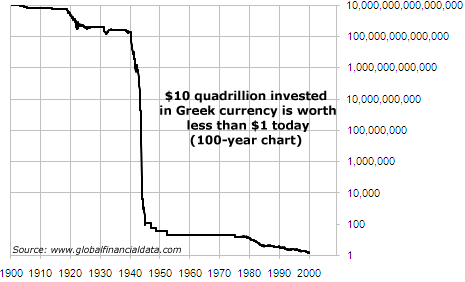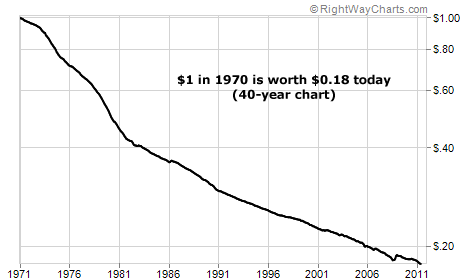| Home | About Us | Resources | Archive | Free Reports | Market Window |
Greece Is Going Bust... And the U.S. Is Following Right BehindBy
Wednesday, June 22, 2011
"The more stable the currency was, the more stable society would be –
And the more successful as well."
– Matthew Lynn, quoting Friedrich Hayek in Lynn's new book, BUST
Greece has a downright depressing record of managing its money and paying its debts. Is the U.S. following Greece's example? Yes...
If you happened to have $10 quadrillion in U.S. dollars back in 1900, and you converted it into Greek currency, it would have been worth less than $1 a hundred years later.
 The previous century in Greece was just as bad. According the book This Time is Different, by Rogoff and Reinhardt, "From 1800 until well after World War II, Greece found itself virtually in continual default [on its debts]."
For the opposite end of the spectrum, consider Switzerland...
If you had $10,000 in U.S. dollars back in 1971, and you converted it into Swiss francs, it would be worth over $50,000 today (not including interest on your money).
.gif) Switzerland has had the most stable money over the last 40 years. And as Hayek predicted, the society with the most stable currency is the most stable and successful as well.
The numbers don't lie... Income per head in Switzerland is $69,000 today, versus $47,000 in the U.S. and $28,000 in Greece.
In his book BUST: Greece, the Euro, and the Sovereign Debt Crisis, Matthew Lynn explains Greece's repeating pattern through history:
Like the old Greek currency, the U.S. dollar has not kept its purchasing power... Today, you must spend $1 to get what would have cost you $0.18 in 1970 – a fall in purchasing power of 82%.
 In Greece today, the people want their government to fulfill all its promises for pensions and wages. The problem is, the promises were too big, and now Greece is broke. There is no money to pay for the promises.
The story in the U.S. is the same. New governments come in and embark on extravagant spending programs. The economy has now crashed. And the government doesn't have the money to pay for the spending programs as promised.
But the people don't want to hear it. How is that different than Greece?
Politically, the government won't be able to cut near enough spending. And it'll be difficult to raise taxes as well. The easiest way out for the government – whether it's Greece or the U.S. – is to let its currency crash.
Friedrich Hayek explained the inevitable outcome decades ago, in his booklet Choice in Currency: A Way to Stop Inflation:
The U.S. is already going down this road. A decade ago, $300 in U.S. dollars would buy you an ounce of gold. Today, it takes over $1,500 to buy an ounce of gold.
The U.S. has been a great country, for centuries. But that doesn't mean it's immune from the simple truth above – printing money is politically easier than cutting spending or raising taxes.
Stable money can lead to a stable and successful society. Right now, U.S. money is unstable. And our society is suffering for it. Banks don't want to lend for the long term. And companies don't want to invest.
What can you do? Make sure you have money outside of U.S. dollars and in history's most stable form of money... gold.
Good investing,
Steve
Further Reading:
"One of the big myths in the marketplace," Brian Hunt writes, "is that despite its colossal government debt and welfare problems, Europe's pan-continent currency, the euro, is holding steady right now." The truth is, it's not. It's plummeting.
The problem with conventional euro price quotes, Brian points out, is they value the currency against other weak paper currencies like the U.S. dollar and the British pound. Gold, however, is "real money." Here at DailyWealth, we've even called it "The Greatest Currency Trade of the Millennium."
Market NotesIT'S "HOUSING WEEK" IN MARKET NOTES We're running a special housing series in Market Notes this week. The point of this series is to remind folks that despite the doom and gloom pessimism, it's actually a good time to go house hunting right now...
One argument for why it's a good idea to buy a house – even a second house – stems from historical U.S. mortgage rates. After all, the cost to borrow money is a huge factor in home-buying and -selling decisions.
Our chart today displays the past 100 years or so in U.S. mortgage rates. As you can see, mortgage rates spent decades fluctuating between 5% and 6%. Due to the great inflation of the 1970s, lenders were scared of inflation eating into the value of their loans, and rates spiked into the high teens.
Nowadays, it's a different story. Rates have been locked in a big downtrend since the 1980s... one that has accelerated lower in the past few years, thanks to the Fed's low-interest-rate policies. Bottom line, if you've got a down payment and decent credit, money for home buying is super cheap!
|
In The Daily Crux
Recent Articles
|

